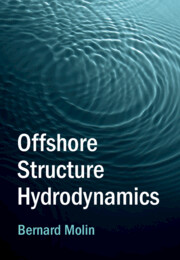Book contents
- Frontmatter
- Contents
- Preface
- Acknowledgments
- Symbols
- Abbreviations
- 1 Introduction
- 2 Environmental Conditions
- 3 Wave Theories
- 4 Wave and Current Loads on Slender Bodies
- 5 Flow-Induced Instabilities
- 6 Large Bodies: Linear Theory
- 7 Large Bodies: Second-Order Effects
- 8 Large Bodies: Other Nonlinear Effects
- 9 Model Testing
- Appendix A: Introduction to Potential Flow Theory
- Appendix B: Hydrostatics
- Appendix C: Damped Mass Spring System
- Appendix D: The Boundary Integral Equation Method
- Author Index
- Subject Index
- References
5 - Flow-Induced Instabilities
Published online by Cambridge University Press: 31 January 2023
- Frontmatter
- Contents
- Preface
- Acknowledgments
- Symbols
- Abbreviations
- 1 Introduction
- 2 Environmental Conditions
- 3 Wave Theories
- 4 Wave and Current Loads on Slender Bodies
- 5 Flow-Induced Instabilities
- 6 Large Bodies: Linear Theory
- 7 Large Bodies: Second-Order Effects
- 8 Large Bodies: Other Nonlinear Effects
- 9 Model Testing
- Appendix A: Introduction to Potential Flow Theory
- Appendix B: Hydrostatics
- Appendix C: Damped Mass Spring System
- Appendix D: The Boundary Integral Equation Method
- Author Index
- Subject Index
- References
Summary
This chapter covers several types of flow instabilities of cylindrical bodies in current: vortex- induced vibrations (VIVs) and galloping, flutter, and wake-induced instabilities (WIO). VIVs mostly affect cylinders of circular cross section and they must be accounted for to assess the fatigue life of risers. The concept of reduced velocity is introduced and illustrative experimental values of VIV responses are given. Predictive methods are briefly described. Galloping instabilities appear at higher values of the reduced velocities for prismatic cylinders. Experimental results are given for a square cylinder and the quasi-static predictive method is outlined. Whereas, in galloping, only one degree of freedom is at hand, in the direction perpendicular to the free stream, in flutter an additional rotational motion comes into play. Finally Wake-Induced Instabilities are described, in the particular case of one circular cylinder in the lee of an upstream one.
Keywords
Information
- Type
- Chapter
- Information
- Offshore Structure Hydrodynamics , pp. 132 - 157Publisher: Cambridge University PressPrint publication year: 2023
